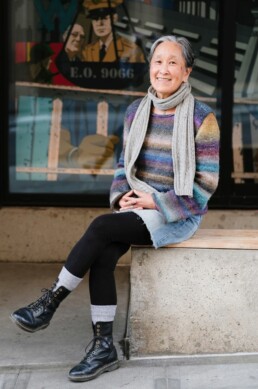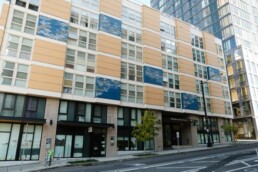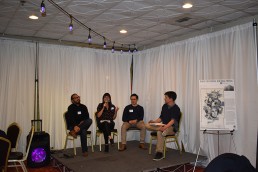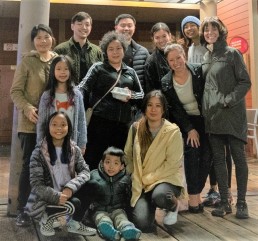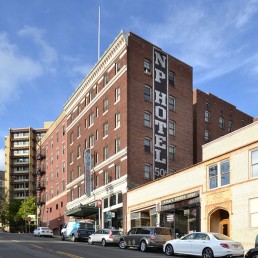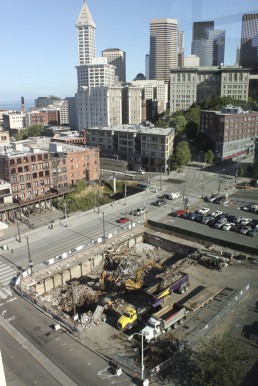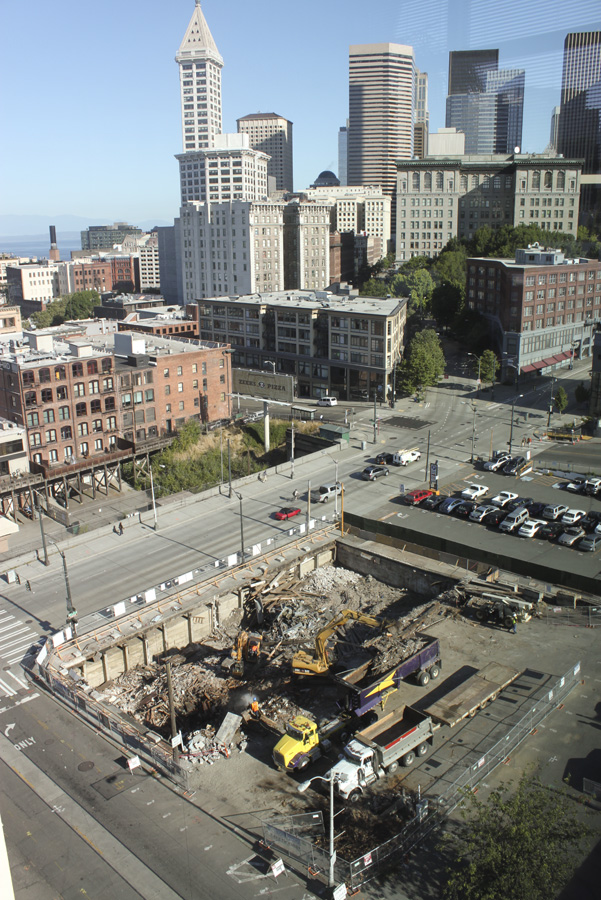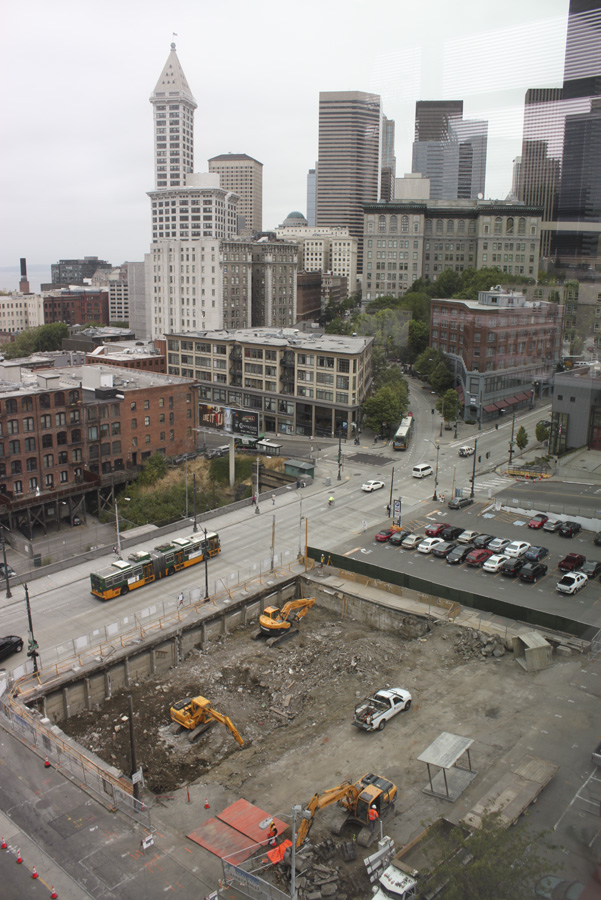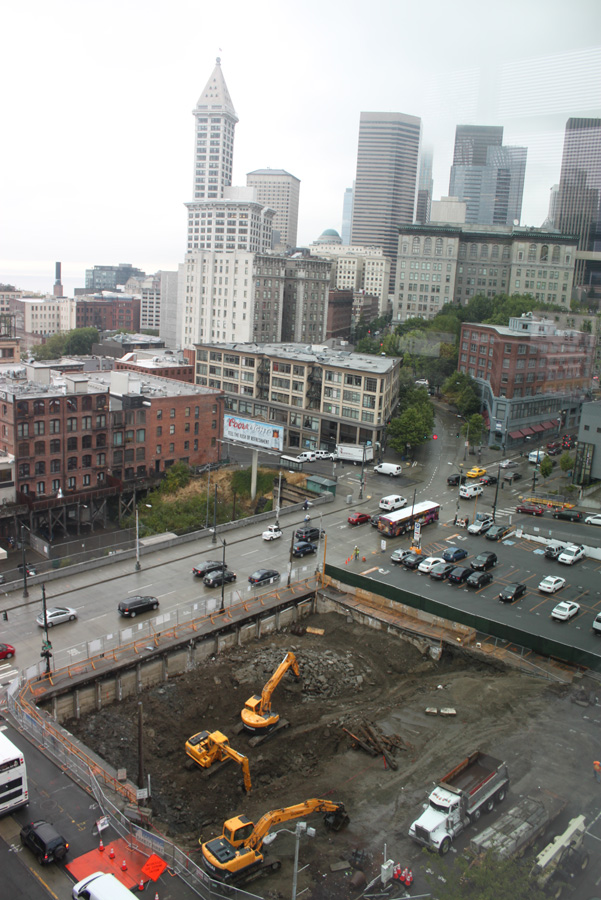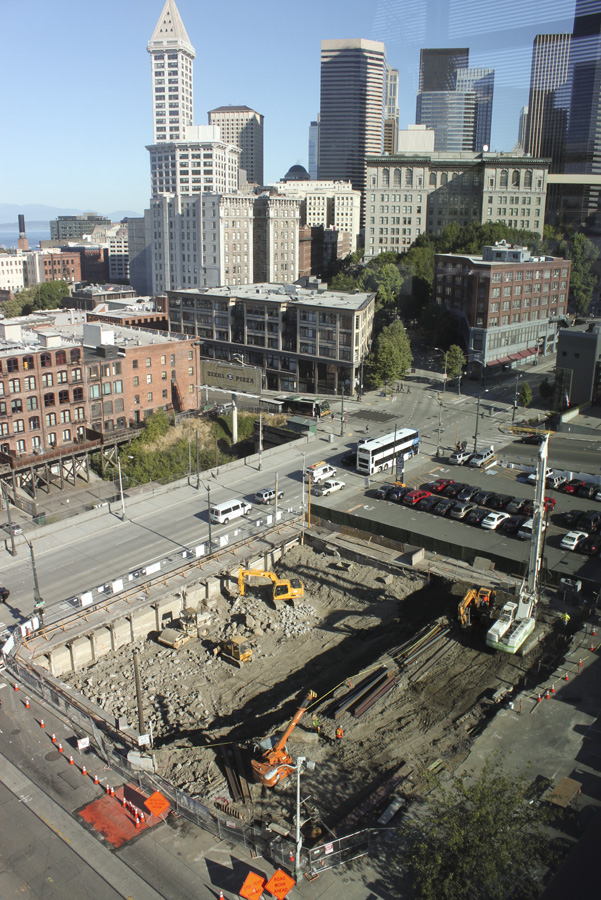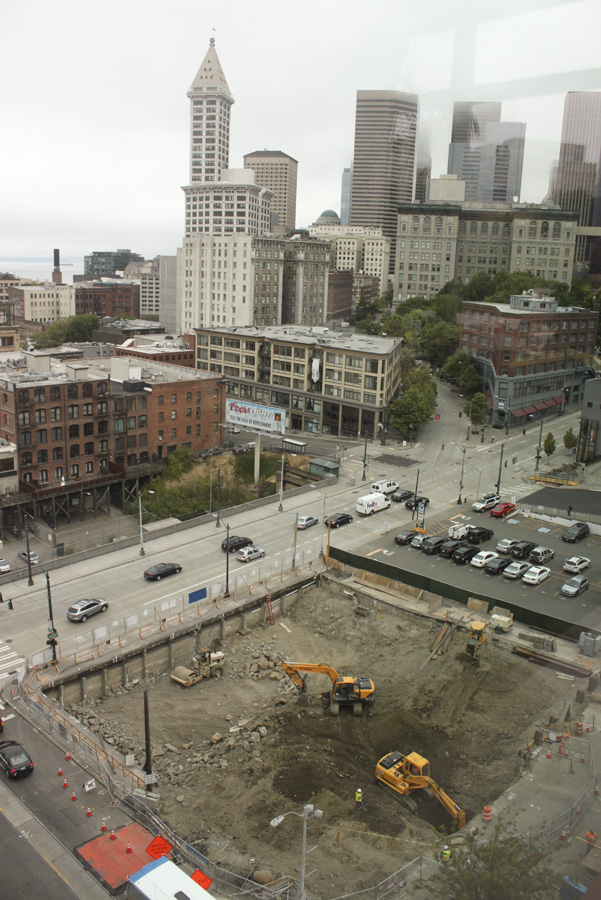Enterprise Article
Building community resilience through placemaking! Enterprise recently showcased InterIm CDA’s real estate development director Leslie Morishita and a few of our buildings in the CID including Hirabayashi Place and Uncle Bob’s Place: “Housing is fundamental,” Morishita said, “but we also want to take every opportunity to serve this community. We include a focus on art to lift the history and culture of the place and engage the community that’s here.” Check our the full article! Photos by Channing Johnson Photography.
InterIm’s Corner: Celebrating community with InterIm CDA

InterIm CDA hosted the second annual fall dinner ‘Connecting with Community’ on October 12th at Joyale Seafood restaurant.
The evening brought together 150 of InterIm CDA’s friends and supporters and we were honored to have the generation of activists who have dedicated their lives for decades fighting for justice and equity for the community, together with our young and upcoming activists who are engaged in fighting for the community.
The program began with a panel discussion titled ‘Continuing the Legacy of Activism’. A panel of three young activists in Seattle, Drag and Drop, owner Ryan Catabaya, Vanishing Seattle, founder Cynthia Brothers, Asian Counseling and Referral Service, civic engagement program manager, Joseph Lachman, and facilitator InterIm CDA, equitable development policy analyst, Derek Lum.
In another session, titled ‘Thriving through the activism’, the staff of InterIm CDA talked about their experiences while working for the community. The event was concluded with activ-ism stories shared by our long-time activists Francisco Irigon, Sharon Maeda, Matt Chan, Leslie Morishita, and State Representative Sharon Tomiko Santos.

The stories of heroic activism undertaken by the leaders present in the room together with stories shared by the younger generation of activists provided an opportunity to all present to be ener-gized, engaged and understand that activism lives on and that InterIm CDA will continue to carry on the legacy of our beloved Uncle Bob.
It was a great night of connecting with old and meeting new friends. InterIm CDA will be hosting the Connecting with Community Dinner on October 15th, 2020.We are excited to once again have the honor of bringing together the activists in the community to continue and advance our fight for justice and equality.


This content was sponosored by InterIm CDA.
InterIm’s Corner: The power of community organizing

To help our community stand up to the daunting threats of gentrification and displacement, I, Derek Lum, was brought on as InterIm’s Equitable Development Policy Analyst. My work centers around advancing policies in a way that amplifies the voices and interests of our most vulnerable community members, and those most impacted by the threat of displacement, including low income, limited English speaking, immigrants, refugees, elders, and more.
I work on a variety of fronts including hosting neighborhood forums, facilitating neighborhood issue discussion groups for residents, encouraging residents to show up at gatherings and events related to displacement, challenging city leaders to produce housing and transportation plans which will work for our community, and connecting community members to opportunities to advocate for equitable solutions to neighborhood issues as they see fit.
These days, I’m attending many resident gatherings to build relationships and to understand people’s concerns and challenges to inform my work. Finally, I collaborate with partner organizations and allies to bring city, state, county, and federal solutions to issues impacting low income immigrants and refugee communities. Every aspect of my work is underpinned by the power of community organizing.
The rallying cry, “Humbows Not Hotdogs!” will forever be linked with the struggles of community activists led by InterIm and Bob Santos, fighting against the King Dome and for the future of the International District in the early 1970s.
In those days, the fight was against a new sports stadium and the associated threats of gentrification and displacement. They’d seen how the construction of new sports stadiums had wiped out other poor, inner city ethnic neighborhoods throughout the country. The King Dome was built, but the power of community organizing was ignited and InterIm went on to lead decades of organizing, advocacy, and development, to protect and revitalize the neighborhood, especially on behalf of its low income, elder, immigrant residents and small mom and pop business owners, who built the neighborhood. Thanks in part to our early community activists, the ID continues now as a vibrant cultural community, a real neighborhood, that supports a mix of residents including low income elders and families, and where new immigrants and refugees can find a welcoming first landing place.
Today, with Seattle’s rapid growth and booming economy, the ID’s location next to downtown and the regional transit hub, and lots of development potential resulting from upzones that allow taller buildings, the neighborhood is facing an unprecedented onslaught of large-scale speculative developments. It’s not one big project that we’re facing now, but lots of private individual developments, whose cumulative impacts threaten to wipe out the ID as we know it. These sorts of developments, driven by profit, and not by serving the community, fuel rising property values and rents that in turn push out low income residents, small mom and pop businesses, community organizations and cultural institutions, that are the heart and soul of the neighborhood.
InterIm is not against development, nor are we against market rate development. InterIm evaluates new developments through the lens of equitable development – development that ensures everyone participates in and benefits from the neighborhood’s growth, especially low-income residents, immigrants and refugees, communities of color, and other marginalized groups at risk of being left behind or displaced. InterIm seeks development outcomes that prevent residential, commercial, and cultural displacement; advance economic mobility, security, and opportunity for the community; support and acknowledge local history and culture; promote transportation mobility and connectivity; and enhance health and safety. InterIm seeks development processes that exemplify transparency and accountability to the community; address historic and current racial and social injustice; advance community self-determination; and preserve community dignity and culture.
As I proceed in my new role at InterIm, I welcome the opportunity to meet with those who share our concerns about displacement, and values around equitable development. If you are a low-income renter in the neighborhood, interested in being involved in community organizing, I’d love to hear from you! Feel free to reach out to me at dlum@interimcda.org. See you around the neighborhood!
This content was sponsored by InterIm CDA.
InterIm’s Corner: InterIm CDA condemns new immigration rule, calls on lawmakers to oppose it too

Dear friends, family, and community,
Today, InterIm is expressing it’s opposition to the Department of Homeland Security’s changes to immigration law. The change in “public charge” law will go into effect on October 15, 2019. This rule will make attaining a green card or U.S. citizenship more difficult for legal immigrants if either themselves or family members rely on public benefits such as food stamps, Medicaid, Medicare, and Section 8 rental assistance vouchers. This rule is extremely harmful to low-income immigrants and refugees, is meant to discourage new immigrants from coming to the U.S and aims to discourage current immigrant residents from using the programs they are entitled to.
Nationally, about 1.1 million Asian immigrants live in families earning under 125% of the poverty line, and over 80% of Asians and Pacific Islanders who received their green cards in 2018 came through the family-based system. The International District is 53 percent Asian Pacific Islander, 58 percent foreign-born, and 53 percent non-citizens. 65 percent of us are below the federal poverty level. This rule could harm countless neighbors in our community, and we must do everything we can to oppose it.
That is why we are glad to see leaders in our community oppose this rule change. We have seen Attorney General Ferguson join a lawsuit against the administration on this rule and Senator Murray recently spoke out against the administration. We are also encouraged by congresspeople Larson, Smith, and Jayapal for their co-sponsorship of H.B. 3222, which seeks to prevent federal funds from being used to enforce this unjust rule. Every Washingtonian should contact their congressional representative and ask them to sign on to this legislation. Additionally, if anybody believes they might be subject to this rule, we urge you to consult a qualified immigration attorney. One non-profit with many qualified attorney’s is the Northwest Immigrant Rights Project, and you can call their Seattle office at 206.587.4009.
This content was sponsored by InterIm CDA.
InterIm’s Corner: Our homelessness prevention programs place the client’s needs at the center

ICDA believes that housing is just the first step. As a Housing and Urban Development certified housing service provider, ICDA helps approximately 4,000 unduplicated individuals each year to achieve their housing stabilization goals. As a housing provider, we have 25 secure units reserved for those at risk of homelessness. In many refugee and immigrant communities, information about services is spread by word of mouth. Because of our 50-year history working within the API and refugee and immigrant communities, ICDA is a trusted provider whose name is shared when families are in trouble. Without ICDA to fill this gap in human services, many at-risk refugee and immigrant individuals and families would not use these lifesaving services.
ICDA’s approach firmly places the client in the center. We provide holistic wrap-around services that include everything from accompanying clients to negotiate with landlords to helping parents sign their children up for school. Our extensive network of partner organizations allows our clients to address a host of needs from legal aid to job training in a linguistically and culturally responsive way. Our staff speak more than a dozen languages and come from the communities we serve, so they have a deep understanding of the challenges our clients face. Our client-centered approach has made us a requested partner to pilot innovative projects such as Housing First both with the city and county over the last 10 years.
Homeless Prevention
Research shows the quicker an individual or family moves out of homelessness, the better their long-term outcomes. We consequently prioritize permanent housing to people experiencing homelessness before attending to other needs. We believe that providing stable housing will give the most essential tool in empowering our clients.
Rapid Re-housing
Rapid rehousing helps individuals and families leave homelessness and find permanent housing through subsidies such as rental assistance and moving costs. Rapid rehousing assistance is offered without preconditions (such as employment, income, absence of a criminal record, or sobriety) and services are tailored to the unique needs of the household. Approximately 85% of ICDA’s Rapid Re-housing clients exit to permanent housing with a 0% return to homelessness.
Diversion
Diversion offers one-time flexible financial assistance to help families exit homelessness. We facilitate families to identify safe housing options based on their available resources. ICDA was one of the four agencies chosen to participate in the 2014-2016 Diversion Shelter Pilot Project. In those two years, we served almost 200 with over 100 diverted with only 2% returning to homelessness that we are aware of.
This content was sponsored by InterIm CDA.
Hirabayashi Place Demolition Underway
Thanks to our friends at the Summit Law Group we will share frequent photos of the construction site from a lofty perch!
Gordon Hirabayashi (civil rights leader) honored at UW
InterIm CDA sponsored a staged reading of “Hold These Truths.” Actor Greg Watanabe gave a moving performance at the Theatre Off Jackson to a sold out crowd on Saturday February 22, 2014 and a near sell out on Sunday February 23, 2014.
Working with family members of Gordon Hirabayashi, professor Steven Sumida, Gail Nomura, the University of Washington Ad Hoc Hirabayashi Committee; Jeanne Sakata (play writer), Jerry Arai; and, with the financial support of Tomio Moriguchi and Hideki Obayashi (UW grad, now in CA) – a special Day of Remembrance symposium was held at the University of Washington.
King 5 interviewed InterIm CDA Acting Director, Andréa Akita, for a piece related to these events, tied to Hirabayashi Place, on Saturday February 22, 2014.

